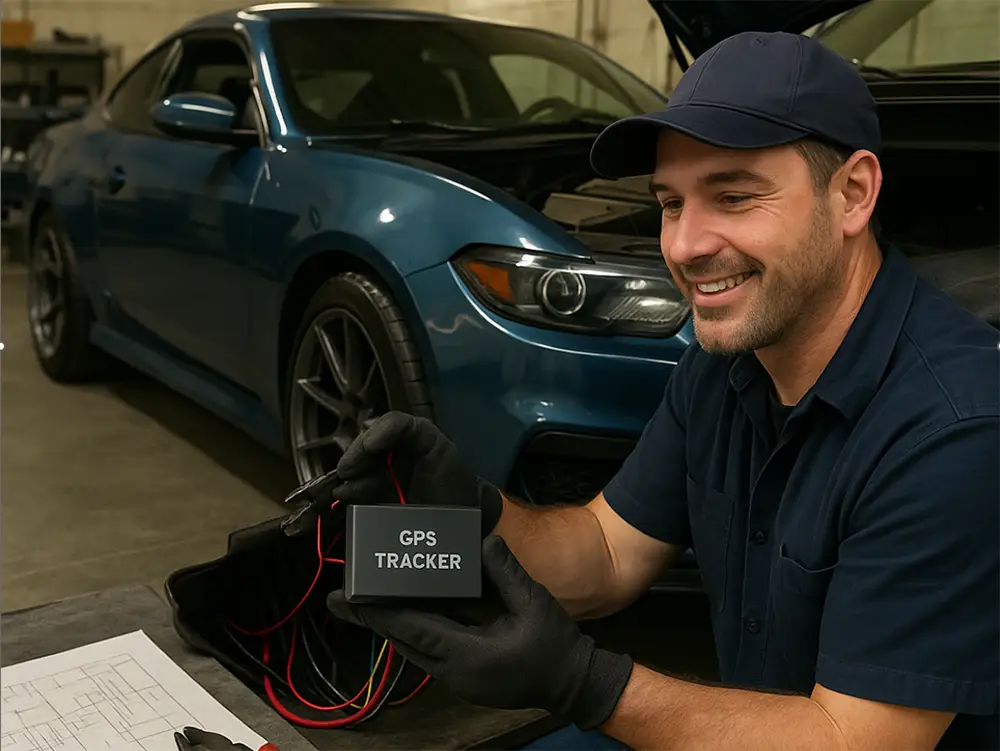 Motortopia Staff
.
June 16, 2025
.
News
Motortopia Staff
.
June 16, 2025
.
News

Key Takeaways
Custom car builds are more than just vehicles—they’re personal projects, time investments, and valuable assets. Whether you’re restoring a classic or building a high-performance street machine, protecting and optimizing your ride is crucial. That’s where GPS trackers come in.
These compact devices do a lot—boosting security, tracking performance, and helping deter theft before it even happens. With custom cars being prime targets, a GPS tracker is a smart, protective upgrade which isn’t just smart—it’s essential..
This guide serves as your friendly, practical companion for installing GPS trackers on your custom car. We’ll walk you through:
Whether you’re a seasoned gearhead or new to DIY mods, this guide gives you the clarity and confidence to track your ride the right way. Let’s get started.
A GPS tracker for custom cars is not a device; it is more than security—it’s about control, visibility, and peace of mind.
Whether you’re working with a modified car, sports car, a lifted off-road rig, or a show-ready ride, protecting and tracking your vehicle is essential. Here’s why GPS trackers are especially important for custom builds compared to stock cars:
Unlike stock vehicles, custom builds often attract more attention—and not always the good kind. Thieves know these vehicles carry high aftermarket value. A hidden GPS tracker acts as a silent safeguard, allowing instant location tracking if your car is ever stolen.
From turbo kits to carbon fiber body panels, custom builds often include expensive, rare, or imported components. GPS tracking gives owners peace of mind, helping locate and recover both vehicles and parts if tampered with.
For modified off-road vehicles, GPS trackers aren’t just for theft protection they help during trail rides, remote excursions, or emergencies. Share your location with friends, or use tracking data to plan your routes better.
Many insurance providers offer discounts for vehicles with verified GPS tracking. For collectors and daily drivers alike, a GPS device can also log driving data and use valuable info for maintenance, resale, and documentation.
If your custom build is stored for long periods or only driven occasionally, GPS tracking lets you monitor battery health, unauthorized movement, and location status right from your phone.
When planning for installing GPS trackers on modified car builds, choosing the right type of tracker is just as important as the install itself. From plug-and-play devices to hidden units under the chassis, each option has its place depending on your build, power access, and tracking goals. Here’s a quick breakdown to help you decide what works best for your custom car.
Hardwired trackers are installed directly into your vehicle’s power system—making them one of the most secure options for custom car GPS installation.
Best for: Show cars, classic builds, and long-term owners who want a set-it-and-forget-it GPS solution.
These trackers plug directly into the OBD-II port, usually located under the dashboard. Perfect for users who prefer a quick, tool-free install.
Best for: DIY builders, daily drivers, or anyone looking for real-time data and hassle-free setup.
Portable trackers run on rechargeable batteries and don’t require a connection to the car’s power system—making them ideal for non-powered or minimal-wiring builds.
Best for: Custom builds without a full electrical system, short-term use, or vehicle fleets with rotating tracker needs.
Best for: Temporary installs, fleet tracking, or added security alongside a primary tracker.
When learning how to install a GPS tracker in a custom car, start by asking:
Your answers will guide whether to go wired, plug-and-play, or battery-powered. For most custom car owners, a hardwired or portable tracker paired with app-based tracking gives the right mix of security and convenience.
| Tracker Type | Best For | Signal Sensitivity | Works with Fiberglass? | Works with Metal Body? | Estimated Cost | Maintenance |
| Hardwired | Long-term, hidden installs | Medium (needs clear line to sky) | Yes | With care | $60–$200 | Low |
| OBD-II | Easy, plug-in users | Low interference | Yes | Yes | $40–$120 | Moderate |
| Battery-Powered | Flexible use, no power builds | High if poorly placed | Yes | May need repositioning | $70–$180 | Medium |
| Under-Car Magnetic | Stealthy tracking | Low (uses signal reflection) | No | Yes | $50–$150 | Medium |
Before installing GPS trackers on custom cars, proper preparation ensures safety, accuracy, and legal compliance.
💡 Tip: Carbon fiber or fiberglass builds can block GPS signals. Plan placement to avoid signal interference.
Whether you’re installing a hardwired unit, an OBD-II device, or a battery-powered tracker, follow these clear steps for safe and efficient installation.
![]()
✅ Tip: Always test before reassembling panels.
![]()
![]()
Ensure smooth performance after installing GPS trackers on custom cars.
Coverage Check : Test your tracker in open spaces, parking garages, and city areas to confirm consistent signal.
Common Issues
Quick Troubleshooting Tips
Test location updates with a short drive to confirm proper function.
When it comes to choosing the right path for installing GPS trackers on modified cars, both DIY and professional options have their place—depending on your skills, tools, and vehicle complexity.
Pros:
Cons:
Pros:
Call a Pro If:
Tip: For custom cars, expert help often pays off in performance, safety, and reliability.
When it comes to installing GPS trackers on custom cars, the value goes far beyond basic location tracking. For builders and enthusiasts, GPS data unlocks a powerful layer of real-time intelligence that can elevate performance, safety, and control.
Modern trackers with OBD-II or CAN bus access can provide:
Ideal for track builds and high-performance cars.
Set geofences for theft alerts or valet safety. Log routes for trip history, lap analysis, or route optimization.
Tech-savvy users can even build their own data infrastructure for total customization.
Installing GPS trackers on custom cars isn’t just a technical job—it comes with legal, ethical, and warranty responsibilities you shouldn’t ignore.
Always get consent from anyone who drives the car. Tracking without permission can break privacy laws. Check your local GPS tracking laws before installation.
Rules vary by state or country. Some allow personal tracking; others restrict it. Ignoring this can lead to legal trouble.
Custom builds often have active warranties. Avoid tapping into sensitive wiring or ECU systems—this can void your warranty. Use OBD-II trackers or consult a pro for hardwired installs.
Installing GPS trackers on custom car builds is just the start—keeping them running smoothly is key to long-term performance and reliability. Here’s how to maintain your setup effectively:
These quick checks keep your tracker reliable and your custom car secure.
Installing GPS trackers on custom cars is more than just a security upgrade—it’s a smart move for performance, protection, and peace of mind. From planning and choosing the right tracker to professional installation tips, understanding the full process helps you avoid risks and maximize value.
Will a GPS tracker drain my battery?
Minimal draw, but constant tracking can affect parked vehicles. Use sleep mode or ignition-based wiring.
Can I hide it under a metal body kit?
No—metal blocks signals. Mount under plastic, near windows, or inside the dash for best reception.
How do I avoid detection or jamming?
Use anti-jam trackers, hidden installs, and alert-enabled apps. Consider a backup unit for added security.
What if the OBD port is disabled?
Opt for a hardwired or battery-powered tracker—perfect for custom electronics setups.
Share Link